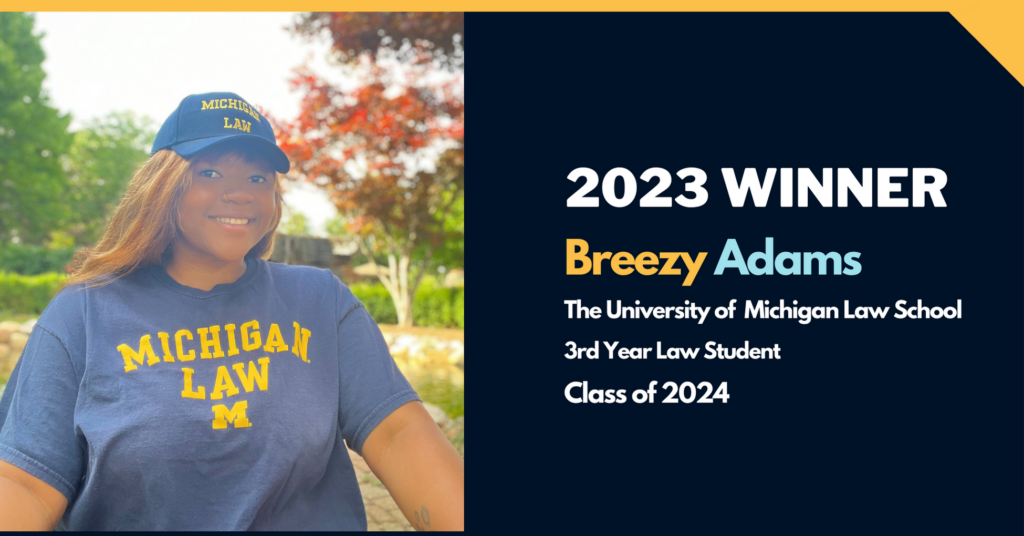Law Student Diversity Scholarship and Application

The Law Student Diversity Scholarship from Michigan Auto Law is an annual scholarship that our attorneys offer to incoming and current law students who demonstrate a strong commitment to issues of diversity as they pursue their legal career.
Our annual scholarship of $2,000 is awarded to one winner.
Through this scholarship, our lawyers strive to honor and provide financial support to law students who contribute to and have worked to encourage greater diversity within the student body of their law school and their undergraduate institutions.
This year we are honored to recognize Breezy Adams who is a third-year law student at The University of Michigan Law School as the winner of our Michigan Auto Law’s 2023 Law Student Diversity Scholarship.
In her essay, “Collaboration. Understanding. Persistence.,” Breezy explains how her extensive mentoring experience in college and graduate school has proved invaluable in helping her to promote and advance diversity at the law school level:
“The adjustment to law school and the professional world was tough for me but made infinitely better because of the strong mentoring community at the University of Michigan. Since my first year, I’ve worked hard to become a strong mentor myself by taking on leadership positions in various organizations including the Black Law Students Association (BLSA), the Law School Student Senate, the Organization for Public Interest Students and the First Year Information Program.”
With Breezy’s leadership, the BLSA is building strong connections with the Latin Law Students Association, the Native American Law Students Association, and the Asian Pacific American Law Students Association.
We believe that others will find Breezy’s hopeful and positive message as inspiring as we did:
“Diversity without inclusion is one of the most critical issues many universities face. It is important to me to spend time understanding how to help students of color utilize their resources and connections to thrive in the academic setting rather than struggle. As a black woman who pushed against the system and is entering a profession that continues to struggle with diversity and inclusion, I believe I have an obligation to be a part of the efforts meant to further develop and increase those efforts. The desire to collaborate with others who see the world differently from me, just as much as with those who look through the same lens, is what drove me to law school, and that desire has only grown to include the larger legal community.”
Eligibility and Selection criteria includes:
- The scholarship program is open to students currently in their first or second year of law school as well as students entering law school in the fall of 2024
- Recipient is a member of an ethnic or racial minority or demonstrates a defined, strong commitment to issues of diversity within their academic career
- Recipient is a U.S. citizen accepted to or currently attending an accredited law school within the United States
- Academic achievement as reflected by an undergraduate cumulative minimum 3.0 GPA
Application Requirements – Application Deadline: June 1, 2024
The Michigan Auto Law Scholarship Program is a competitive process. Applicants must submit the following items:
- A completed application (see below)
- If entering law school in the fall of 2024, a copy of your acceptance letter to law school
- A typed essay no more than three pages long describing your efforts to encourage greater racial or ethnic diversity within the student body of your law school and/or undergraduate program
The winner of the 2024 scholarship will be announced in August of 2024.
How to apply
For questions please email us at [email protected]
Michigan Auto Law Car Accident Injury Survivor Scholarship
Michigan Auto Law is currently offering another scholarship for anyone attending a U.S. college or university who was injured in a car accident. The Michigan Auto Law Car Accident Injury Survivor Scholarship was created to lend a hand to those injured accident victims who are demonstrating resolve and determination to rebuild their lives. Visit the Car Accident Resource Center to learn more.





